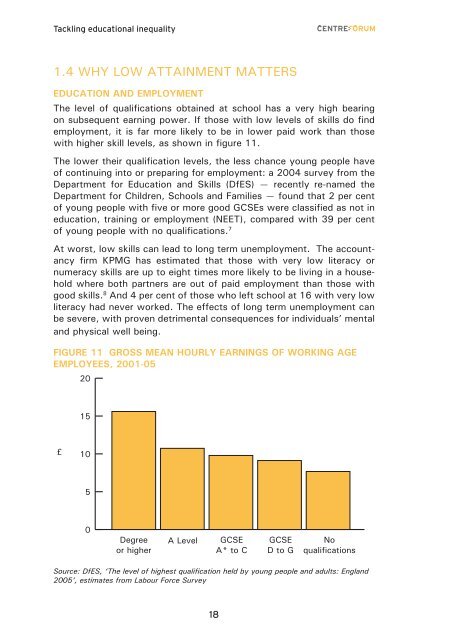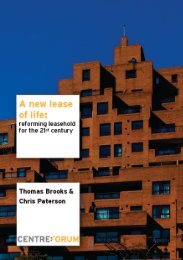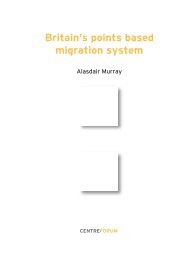Tackling educational inequality - CentreForum
Tackling educational inequality - CentreForum
Tackling educational inequality - CentreForum
You also want an ePaper? Increase the reach of your titles
YUMPU automatically turns print PDFs into web optimized ePapers that Google loves.
<strong>Tackling</strong> <strong>educational</strong> <strong>inequality</strong><br />
1.4 WHY LOW ATTAINMENT MATTERS<br />
Education and Employment<br />
The level of qualifications obtained at school has a very high bearing<br />
on subsequent earning power. If those with low levels of skills do find<br />
employment, it is far more likely to be in lower paid work than those<br />
with higher skill levels, as shown in figure 11.<br />
The lower their qualification levels, the less chance young people have<br />
of continuing into or preparing for employment: a 2004 survey from the<br />
Department for Education and Skills (DfES) — recently re-named the<br />
Department for Children, Schools and Families — found that 2 per cent<br />
of young people with five or more good GCSEs were classified as not in<br />
education, training or employment (NEET), compared with 39 per cent<br />
of young people with no qualifications. 7<br />
At worst, low skills can lead to long term unemployment. The accountancy<br />
firm KPMG has estimated that those with very low literacy or<br />
numeracy skills are up to eight times more likely to be living in a household<br />
where both partners are out of paid employment than those with<br />
good skills. 8 And 4 per cent of those who left school at 16 with very low<br />
literacy had never worked. The effects of long term unemployment can<br />
be severe, with proven detrimental consequences for individuals’ mental<br />
and physical well being.<br />
Figure 11 Gross mean hourly earnings of working age<br />
employees, 2001-05<br />
20<br />
15<br />
£<br />
10<br />
5<br />
0<br />
Degree<br />
or higher<br />
A Level<br />
GCSE<br />
A* to C<br />
GCSE<br />
D to G<br />
No<br />
qualifications<br />
Source: DfES, ‘The level of highest qualification held by young people and adults: England<br />
2005’, estimates from Labour Force Survey<br />
18





